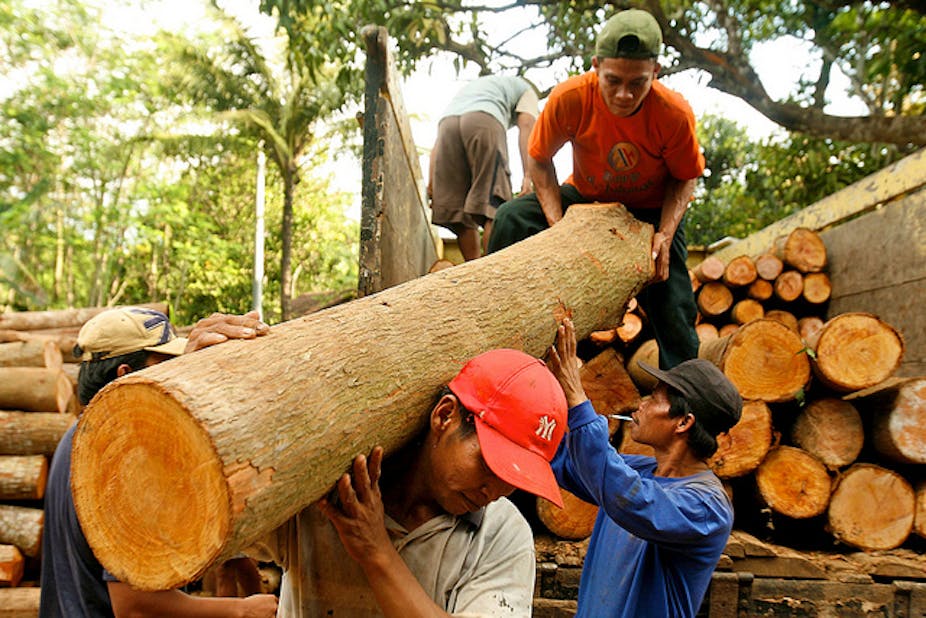The Australian Senate is about to take on the task of stopping illegal logging, with legislation banning the importation and sale of timber products containing illegally logged timber being considered this month.
But how does it stack up against laws introduced by other countries to take on this problem?
The actual extent of illegal logging around the world is almost impossible to quantify, mainly because there is no clear definition of what is legal and illegal. However, it is significant. What is acceptable in one country is not in another.
Australian legislators are hoping to put a stop to the importation of any illegally sourced wood and wood products. The Europeans and North Americans are doing the same, albeit in different ways.
The proposed Australian illegal logging law recognises the immense problem of determining if a particular wood product such as paper has been made from illegally sourced wood fibre. It is based on “suspicion” or the likelihood of a country having an illegal logging industry, rather than any absolute evidence.
The Australian law tries to identify countries that will likely manufacture products that contain illegal fibres. Corruption indexes such as the Transparency International rating will be an indicator. Normally it is accepted that high institutional corruption will likely mean illegal forestry activities, particularly in the case of developing countries.
Australia’s main focus is Indonesia. The Australian Government is trying to develop a strong trade relationship with our northern neighbour, so dealing with illegal forestry poses an interesting policy.
Indonesia has moved up the Transparency International rating over the past few years. This reflects activities by the Indonesian government to crack down on endemic corruption. There has been a two-year deferment on the powers of the Australian illegal logging bill. Perhaps this reflects the concern the government has with the law will affect the growing regional trade relationship.

The European Forest Law Enforcement, Governance and Trade (FLEGT) law approaches the illegal logging issue differently. A core part of the FLEGT law is a series of Voluntary Partnership Agreements (VPAs). These involve the EU working with supplier nations of wood products to ensure systems are in place to confirm the legality of any wood exported to the EU.
When there are weaknesses in a supplier nation’s systems of legality, the local authorities and the FLEGT work together to bring the system to an agreed standard. The VPA is based on a combination of a local robust system and an agreed level of mutual monitoring in both the supplier nation and the EU.
The EU is currently working on a VPA with the Government of Indonesia. So while the Australian illegal logging law appears to be alienating a major potential trading partner, the Europeans are using the same law to strengthen trade and political relationships.
In addition the EU Trade Regulations, EUTR have been modified to require due diligence by importers of wood products making sure they have done everything possible to ensure the products they are importing into the EU are from legal origins. Heavy penalties can be handed out if an importer has failed to ensure the legality of wood products.
In the US, the Lacey Act places a great deal of the onus on the importer of any wood or wood product. The importer has to take “due care” to make sure the wood used has been harvested, owned and manufactured legally, although the definition of “legal” is vague. It cannot simply mean that the supplier adheres to the supplier nation’s laws because these laws may be inadequate.

The Lacey Act does bring attention to the problem of illegal logging. But its broad scope is likely to result in an endless stream of accusations against products that are imported. Ultimately this approach could be used by some suppliers simply to keep their competitors at bay through continuous accusations.
This lack of global consistency in defining illegal logging, wood and wood products makes this issue complicated. In the end political compromises will likely mean nothing actually changes.
The proactive methods employed by the European FLEGT law seem to be the most workable solution. But the EU is finding that negotiating, agreeing and then managing VPAs with developing countries is a monumental task. Notably however, the approach places the onus on the exporter.
The Indonesian government has introduced its own mandatory timber legality verification system, called SVLK). They’re applying it to all their exporters with assistance from the EU FLEGT program. By 2015 all wood products exported from Indonesia must have an SVLK certification of legality. In addition the EU will only accept SVLK certified wood products from Indonesia under the FLEGT law. This doubles the assurance that all Indonesian wood exported to the EU is legal.
The EU is taking a more consultative approach to the very difficult problem of illegal logging, working on exporter nations and importers equally. It is a contrast to the importation barriers Australia and the US want to put up. Time will tell which is the most effective approach.
Read more on illegal logging legislation.

